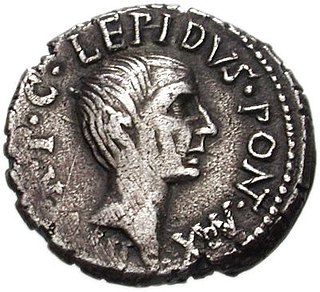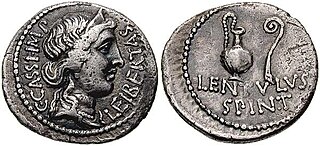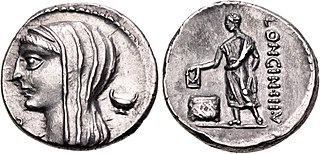Character history
Cassius only appears in the last three episodes of season 1 and most of the first half of season 2. He is briefly introduced in 1-10 "Triumph." In 1-11 "The Spoils" he tells Brutus that the plebs want him to rescue them from Caesar. When Brutus disagrees, Cassius calls him a coward and tells him that he has the power to end Caesar's tyranny.
In 1-12 "Kalends of February" Cassius is plotting the downfall of Caesar, along with Brutus, Servilia, Casca and Quintus Pompey. After Casca first stabs Caesar, Cassius joins in with the others in stabbing the dying leader. After cajoling Brutus to deliver the death blow, he declares "Thus ever for tyrants!" and thrusts Brutus's hand into the air.
In 2-1 "Passover," it is revealed that Cassius had ordered Mark Antony to be killed behind Brutus' back. It is only after Antony offers the conspirators amnesty that Brutus confronts Cassius about this in private. Cassius, Servilia, and Marcus Tullius Cicero insist that Antony must die, but Brutus refuses; there must be reconciliation. After Caesar's funeral, Cassius and Brutus are forced to flee Rome on Antony's advice.
In 2-3 "These Being the Words of Marcus Tullius Cicero," Cassius and Brutus are seen in Bithynia, asking the king for money so they can raise an army to defeat Mark Antony. Things don't go too well, as Brutus has drunk too much and is easily provoked by heckling foreigners. Cassius leads him away before he causes trouble.
In 2-4 "Testudo et Lepus (The Tortoise and the Hare)," both Cassius and Brutus set up camp in western Turkey. Their strength has risen to 38,000 with assistance from foreign allies. Cassius expresses a desire for Brutus to have a bust of his face made, for it will please his mother to see it.
In 2-5 "Heroes of the Republic," Cicero warns Cassius and Brutus via letter that Gaius Octavian has declared them both traitors and enemies of the state; furthermore, Cicero implores them to return and rescue the Republic. Cassius feels outraged upon receiving the news, but Brutus sees this as an opportunity to crush Octavian and Mark Antony, who are fighting each other, separately. Both brothers-in-law are seen nearing the Hellespont towards Greece.
In 2-6 "Philippi," Cassius and Brutus learn that Mark Antony and Gaius Octavian have united, outnumbering them nineteen to fourteen, and are within a day's march. While Cassius urges for a retreat, Brutus suggests they stay and fight, for they have the higher ground. Next day, before the Battle of Philippi ensues, Brutus wishes Cassius a happy birthday and apologizes that there is no cake. Cassius just smiles and is sure that Brutus get an "extra big" cake next year. "No cinnamon," he adds. "Makes me sneeze." As the battle begins, Cassius asks if Brutus would like the honor to personally leads the troops. Brutus declines and insists that his brother-in-law go, to which he is grateful. Cassius is later seen being carried to Brutus on a litter, mortally wounded. His last words are "Hell of a birthday."
Year 43 BC was either a common year starting on Sunday, Monday or Tuesday or a leap year starting on Sunday or Monday of the Julian calendar and a common year starting on Monday of the Proleptic Julian calendar. At the time, it was known as the Year of the Consulship of Pansa and Hirtius. The denomination 43 BC for this year has been used since the early medieval period, when the Anno Domini calendar era became the prevalent method in Europe for naming years.
This article concerns the period 49 BC – 40 BC.

Marcus Junius Brutus, often referred to as Marcus Brutus or simply Brutus, was a Roman politician during the political turmoil of the late Roman Republic. After being adopted by his uncle, Quintus Servilius Caepio, he used the name Quintus Servilius Caepio Brutus, but eventually returned to using his original name. He took a leading role in the assassination of Julius Caesar.

Year 42 BC was either a common year starting on Monday, Tuesday or Wednesday or a leap year starting on Tuesday of the Julian calendar and a common year starting on Tuesday of the Proleptic Julian calendar. At the time, it was known as the Year of the Consulship of Lepidus and Plancus. The denomination 42 BC for this year has been used since the early medieval period, when the Anno Domini calendar era became the prevalent method in Europe for naming years.

Marcus Aemilius Lepidus was a Roman patrician and statesman who was a part of the Second Triumvirate alongside Gaius Julius Caesar Octavianus and Marcus Antonius, and the last Pontifex Maximus of the Roman Republic. Lepidus had previously been a close ally of Julius Caesar.

Gaius Cassius Longinus, often referred to as Cassius, was a Roman senator and general best known as a leading instigator of the plot, who assassinated Julius Caesar on March 15, 44 BC. He was also the brother-in-law of Marcus Junius Brutus, another leader of the conspiracy. He commanded troops with Brutus during the Battle of Philippi against the combined forces of Mark Antony and Octavian, Caesar's former supporters, and committed suicide after being defeated by Mark Antony.
Servilia was a Roman matron from a distinguished family, the Servilii Caepiones. She was the daughter of Quintus Servilius Caepio the Younger and Livia, thus the half-sister of Cato the Younger. She married Marcus Junius Brutus the Elder. They had a son Brutus the Younger. After her first husband's death she married Decimus Junius Silanus and had a son and three daughters with him.

The gens Cassia was a Roman family of great antiquity. The earliest members of this gens appearing in history may have been patrician, but all those appearing in later times were plebeians. The first of the Cassii to obtain the consulship was Spurius Cassius Viscellinus, in 502 BC. He proposed the first agrarian law, for which he was charged with aspiring to make himself king, and put to death by the patrician nobility. The Cassii were amongst the most prominent families of the later Republic, and they frequently held high office, lasting well into imperial times. Among their namesakes are the Via Cassia, the road to Arretium, and the village of Cassianum Hirpinum, originally an estate belonging to one of this family in the country of the Hirpini.
Decimus Junius Brutus Albinus was a Roman politician and general of the 1st century BC and one of the leading instigators of Julius Caesar's assassination.

Publius Servilius Casca Longus was one of the assassins of Julius Caesar. He and several other senators conspired to kill him, a plan which they carried out on 15 March, 44 BC. Afterwards, Casca fought with the liberators during the Liberators' civil war. He is believed to have died by suicide after their defeat at the Battle of Philippi in 42 BC.
Junia Tertia, also called Tertulla, was the third daughter of Servilia and her second husband Decimus Junius Silanus, and later the wife of Gaius Cassius Longinus.
"The Ram Has Touched the Wall" is the fifth episode of the first season of the television series Rome.

Empire is an American historical television series for ABC. It is an historical drama set in 44 BC Rome, and covers the struggle of a young Octavius, the nephew and heir of Julius Caesar, to become the first emperor of Rome. Octavius is helped in his quest by a fictitious gladiator called Tyrannus.
Marcus Tullius Cicero Minor, or Cicero the Younger, was born in 65 BC. He was the son of Marcus Tullius Cicero, who as a distinguished orator and consular senator was one of the leading figures of the Roman Republic during the 1st century BC, and his first wife, Terentia. Cicero Minor had an elder sister, Tullia, who was born in 79 BC and died in 45 BC.

The October Horse is the sixth novel in Colleen McCullough's Masters of Rome series.
"Passover" is the first episode of the second season of the television series Rome and is an Emmy Award winner in the category Outstanding Cinematography for a Single Camera Series photographed by Alik Sakharov, A.S.C.
"Philippi" is the sixth episode of the second season of the television series Rome. The episode portrays the civil war between the Second Triumvirate and the combined forces of Marcus Junius Brutus and Gaius Cassius Longinus, murderers of Julius Caesar. The Battle of Philippi is featured in this episode.

The assassination of Julius Caesar was a conspiracy of several Roman senators, notably led by Marcus Junius Brutus, Cassius Longinus and Decimus Junius Brutus, at the end of the Roman Republic. They stabbed Caesar to death in the Theatre of Pompey on the Ides of March 44 BC.
Marcus Favonius was a Roman politician during the period of the fall of the Roman Republic. He is noted for his imitation of Cato the Younger, his espousal of the Cynic philosophy, and for his appearance as the Poet in William Shakespeare's play Julius Caesar.

Marcus Tullius Cicero is a historical figure who features as a character in the HBO/BBC2 original television series Rome, played by David Bamber. He is depicted as a moderate politician and scholar, who is challenged with trying to save the traditional Republic from the ambitions of the various characters on the show. The real Cicero was a Roman politician, writer, and orator.










